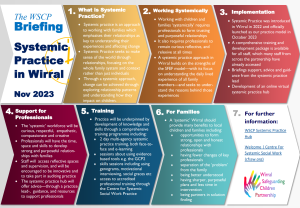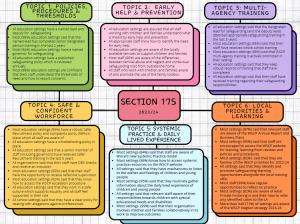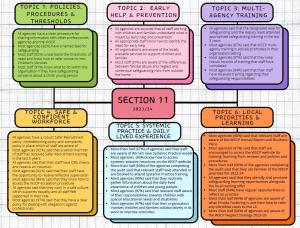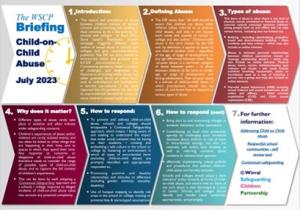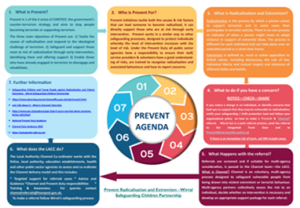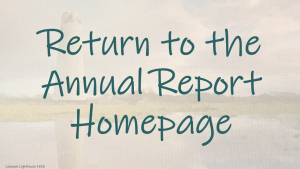Annual Report 2023 – Key Activity

Chapter Contents
- Systemic Practice
- Multi-agency Auditing and Section 11/175
- Multi-agency Training
- Training for Schools and Colleges
- Child Death Overview Panel
- Managing Allegations
What is Systemic Practice?
Systemic practice is a way of working which emphasises people’s relationships as key to understanding their experiences and affecting change. It seeks to make sense of the world through relationships, focusing on the whole family system rather than individuals.
Through a systemic approach, change can be achieved through exploring relationship patterns and understanding how they impact on children.
Working with children and families ‘systemically’ requires professionals to form trusting and purposeful relationships with families, and to remain curious and reflective at all times.
In Wirral, a systemic practice approach builds on the principles of the SFEF model and the strong partnership practice already established.
Features of SFEF, such as understanding the daily lived experience and holding purposeful conversations with children and family members are already valuable parts of a systemic approach.
The WSCP officially launched systemic practice at our learning event in October 2023.
Introduction of Systemic Practice in Wirral
Between agreeing to develop a systemic practice model early in 2022 and the launch in October 2023 the following activity and progress has been made:
- establishment of a multi-agency steering group and implementation plan
- development of a multi-agency training package supported by Warrington Council following their own successful journey to develop a systemic practice model
- appointment of a systemic practice lead in the Local Authority
- delivery of 2 day multi-agency training to over 500 professionals since September 2022
- delivery of a number of skills workshops focussing on practice elements such as genograms and safe uncertainty
- development and delivery of complementary training courses including introductory training for non-frontline staff, writing to the child training and supervision training for managers
- introduction of an online version of the full systemic practice training to make it as accessible as possible
- work to develop an online systemic practice hub as a ‘one stop shop’ for resources for professionals, and development and publication of a range of resources and guidance
- rebranding of existing Supporting Families Enhancing Futures (SFEF) resources to support the gathering and understanding of the voices and daily lived experience of children, young people and families
- partnership commitment to and launch of the model in October 2023
Systemic Practice…in Practice
One of the tools which practitioners can easily work with families which will help them understand the relationships and dynamics is a genogram. This is a diagram which shows all the family members and can be explored with them to identify strong relationships, and those where support might be needed. Genograms are useful co-production tools in which the family – who are the experts of their own experience – can work collaboratively with practitioners to develop solutions to issues and problems.
An example of how a social worker successfully used a genogram with a family is included below (names changed).
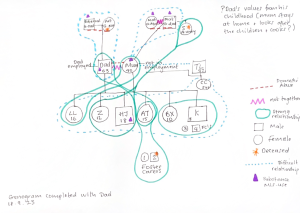
In this example the social worker co-produced the genogram with family members over time, working at their pace. The family designed the symbols and chose the colours used to represent the various relationships. The co-production led to the family being worked with as an equal partner rather than ‘done to’ and gave them control over the support then needed.
The social worker said that working in this way gave them a valuable insight into the family’s dynamics and their world view. The information from the genogram influenced the plans to be made with the family, which in this case led to a one of the children returning home and a strengthening of relationships.
Embedding Systemic Practice in Wirral – Next Steps
Work to implement and embed systemic practice across the partnership will continue throughout 2024, and will include the following activity:
- continue to deliver a range of training and briefing programmes throughout 2024
- further development of the resources in the systemic practice hub
- develop additional expertise through the introduction of accredited training from the Centre for Systemic Social Work Practice
- publication of a quality assurance framework to help measure the effectiveness and impact of the model, including feedback from children, families and professionals, audit and case study activity
- independent scrutiny of the first 18 months of the model
- review of current ways of working to ensure they are compatible with, and support a systemic practice approach
- development of the model beyond multi-agency children’s services, as a wider partnership approach to working with families
Further Information and Training
WSCP Systemic Practice webpage: wirralsafeguarding/systemic-practice
Multi-agency training (registration required to access): wirralsafeguarding/systemic-training
Systemic Practice 7 Minute Briefing:
Multi-agency Auditing and Section 11/175
The WSCP’s multi-agency Quality Assurance Committee leads, directs and supports coordinated multi-agency performance information, audit, scrutiny and review activity, which enables the safeguarding partners to assess the effectiveness of services for children in need of help and protection.
The WSCP Quality Assurance Committee produces quarterly reports for the safeguarding partners identifying themes, trends and risks in multi-agency safeguarding performance. The report is based on information identified and reported by partner agencies.
The group also undertakes multi-agency audits which inform recommendations and influence practice. The committee uses an audit action plan to monitor progress to actions and ensure learning is shared and embedded.
In 2023 the committee undertook audits on the following themes:
- Exploring the rising number of children looked after (CLA) aged between 0-5 years.
Wirral Safeguarding Children Partnership’s Quality Assurance Committee completed an audit of 6 cases to explore the reasons for the rising number of looked after children aged between 0-5 years.It was noted that Children’s Services has seen a rise in CLA for the period in the April 2022 – April 2023, specifically amongst the 0 to 5 age group and this continues to rise.LA data confirmed that between April 2022 and April 2023, 180 children became looked after; 73 of those were aged between 0-5 years (41%). By comparison, in the same period the previous year (April 2021—April 2022), 83 children became looked after and 26 were aged between 0-5 years 31%).Wirral Safeguarding Children Partnership completed an audit of 6 children aged between 0-5 who became looked after between April 2022 and April 2023. The audit considered strengths in practice, missed opportunities, poverty and whether interventions were effective.The 7 minute briefing for this audit can be found below: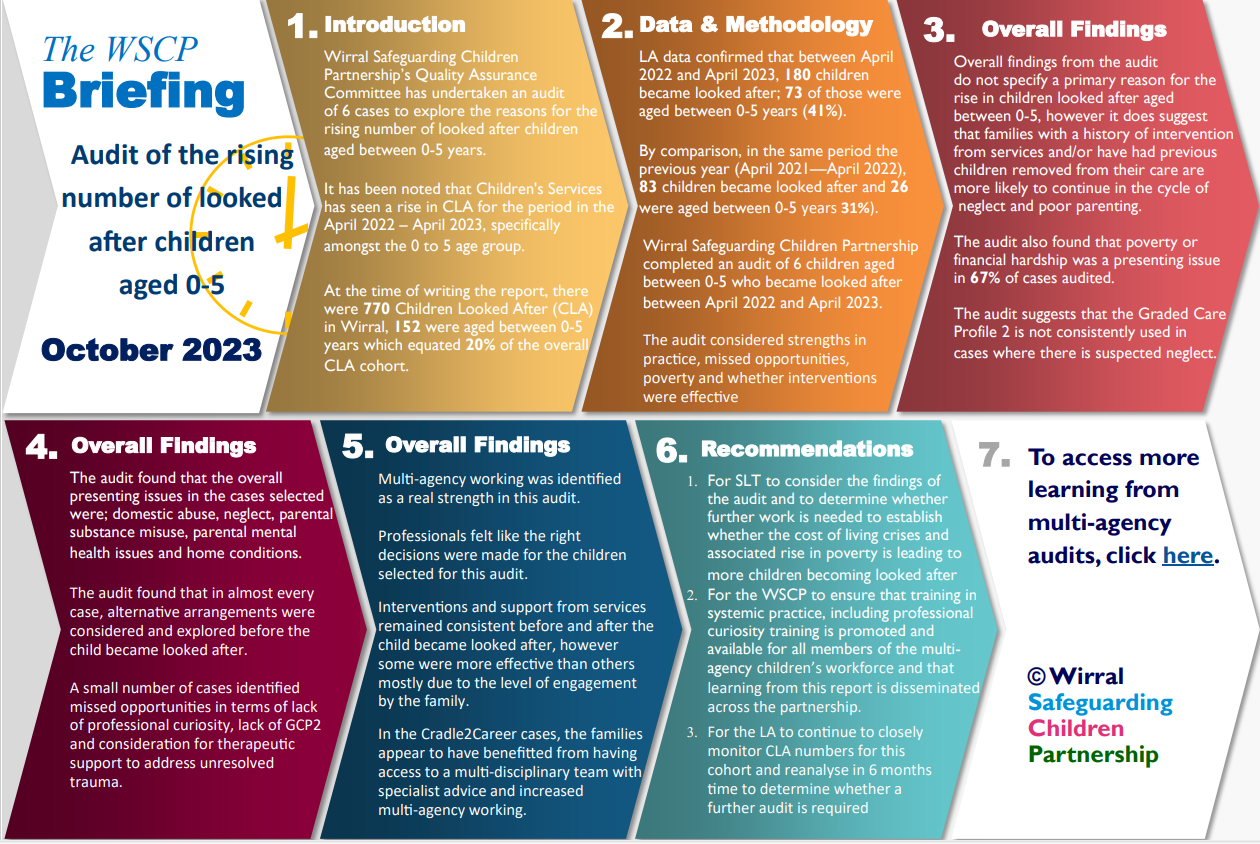
- Parental Substance Misuse
A multi-agency survey was prepared using Survey Monkey to test practitioner’s knowledge and confidence in parental substance misuse, and how it effects children.
The survey explored the type of training undertaken by staff and how they use this knowledge in day to day practice. The survey assisted partners in identifying the need for further or more comprehensive training for staff and to understand whether the current guidance and protocol is fit for purpose. This was a repeat survey following an audit and survey completed in 2022. This enabled the WSCP to directly compare responses and evidence increased and embedded knowledge in the last 12 months.The full audit report from 2022 can be found here.In conclusion, this activity revealed there is still a large percentage of frontline staff who are unfamiliar with the protocol and guidance document for working with families affected by substance misuse.The survey found that there has been a significant increase in the attendance at specific parental misuse training. Despite the increase in training participation, there has been a significant decline in the confidence of staff working with families where substance misuse is a factor. It was acknowledged last year that the result was surprising and potentially inaccurate given the percentage of staff who said they had attended substance related training. This year’s result appears to be more accurate. Staff expressed willingness and enthusiasm to learn more about parental substance misuse and the impact on children, in order to support them in their role and to effectively assess risk.Professionals are increasingly aware of the potential harm and negative impact that parental substance misuse has on children and young people. However, professionals appear to be less confident in challenging parents on their use of substances and knowing how to access specialist support. The WSCP Quality Assurance Committee agreed a series of recommendations in response to the findings from this survey. The learning and recommendations have been shared across the partnership.
- Pre-Birth Arrangements
Wirral Safeguarding Children Partnership designed and published a survey to test professional’s understanding of the pre-birth protocol and guidance, including referral timescales and identifying risk factors. The survey was shared across the partnership and received 72 responses. Health service providers (42%) and Children’s Services (39%) participated the most across the partnership.The survey revealed that understanding of the pre-birth protocol and guidance is inconsistent across the partnership. Professionals do not appear to be confident about where to access information, timescales and the function of pre-birth liaison. As a result of this survey, the Named Midwife for Safeguarding is working with staff across the workforce to share the learning and is focusing on specific staff groups to address gaps in knowledge.
- Child Exploitation Survey
WSCP asked strategic leads for safeguarding to complete a questionnaire to test their response and preparedness to combat exploitation of children. The survey was also undertaken during 2022, this has enabled the WSCP to compare responses.The survey received 29 responses from WUTH, WCHCT, RASA, Merseyside Police, Family Matters, Impact North West, Children’s Services, Response, Early Childhood Services, Youth Justice Service, The Hive, WEB, and a number of education settings. The survey asked agencies how they know that their service reduces the impact of risk on children and young people.The responses included:
– service audits
– listening to feedback from young people
– weekly monitoring
– feedback from staff changing
– data analysis 86% of organisations said that they have a strategic lead who has oversight of single and multi-agency activity in relation to exploitation. 34% of organisations said that they have identified barriers to effective multi-agency activity to combat exploitation (increase of 13% compared to last year), such as:
– staff turnover across the partnership
– differences in the quality of information sharing across services
– maintaining trust with children and young people while appropriately sharing information with services
90% of agencies said that their workforce are suitably trained to effectively combat the exploitation of children. This is an increase of 4% compared to last year’s survey.
93% of agencies said that they raise awareness of exploitation (increase of 7% compared to last year’s audit) using the following methods:
– Sharing communications and newsletters
– Team meetings
– Supervision
– INSET Days
– Training for staff
– 7 minute briefings
– Attending learning events and forums.We asked agencies if they are confident that their frontline staff know how to recognise the signs that a child may be at risk of exploitation. 55% said that they are fully confident (increase of 5% compared to last year)and 45% said that they are quite confident. This is an improvement in comparison to the last survey. We also asked agencies if they are confident that their frontline staff know how to make a referral. 86% said that they are fully confident (increase of 29% compared to last year) and 14% said at they are quite confident. This is a significant improvement in comparison to the last survey. We asked agencies if they are confident that their frontline staff can build trusting relationships with children who have been exploited. 97% of agencies said yes. This is a 26% improvement compared to last year.Findings from the questionnaire remind professionals to:
– Continue to ensure that the voice of the child informs planning for individual children
– Ensure that agencies routinely audit the quality of service delivered to children at risk of exploitation
– Further explore the barriers to practitioners building trusting relationships including information sharing. The CE training includes advice around working effectively with children who have been exploited and Systemic Practice promotes building meaningful relationships.
Section 11/175 Safeguarding Audits
The Section 11 (organisations) and Section 175 (schools and colleges), audits are self assessments undertaken each year by all agencies who work with children and young people. The purpose of the audits is for each agency to test how robust and effective their safeguarding arrangements are.
The WSCP gathers the information from the six themed audits each year to help it assess the effectiveness of safeguarding locally. The findings are tested by the partnership through a series of accountability meetings and deep dive audits as part of out quality assurance arrangements.
The Wirral Section 11/175 audit model includes short audits undertaken throughout the year using Survey Monkey, the topics for 2022/23 are below:
– Policies, Procedures & Thresholds
– Contextual Safeguarding
– Multi-agency Training
– Safer Workforce
– Understanding the Daily Lived Experience of Children
– Local Priorities & Learning
During July, accountability meetings were held with key Section 11 agencies, where they had the opportunity to present their audit findings to a multi-agency panel. The panel asked each agency a series of questions to explore the strength of their safeguarding arrangements and to help agencies to set goals for the year ahead. This exercise also helped the WSCP to identify areas of focus for the forthcoming year and it supports the training needs analysis.
The panel was well attended and a record was made of each agencies meeting, highlighting strengths and areas for further improvement.
During August, a selection of Section 175 audits were dip sampled by the WSCP; including Primary, Secondary, Alternative Education Providers and Special Schools. This included Academy schools and LA maintained. A total of 22 schools/settings were audited. Findings will be feedback to individual schools during September. The WSCP plan to devise an accountability meeting model for schools for 2024.
Headline findings from each topic of the last completed full cycle of Section 11 and 175 audits can be found in the report below:
A summary of findings from the current cycle of S11/175 is also shown below.
Multi-agency Training
It has been another busy year for the WSCP Training Pool who, for just over a year, have been delivering a hybrid training calendar of virtual and face to face sessions. Between January and December 2023, the WSCP delivered 60 multi-agency events to a total of 956 professionals, from all sectors. The largest number of attendees on the multi-agency training continues to be from Social Care and Children’s Services making up nearly 50% of all attendees, with the Health, Voluntary and Charity, and Education Sectors being the next largest groups of attendees. A breakdown of attendees can be seen below:
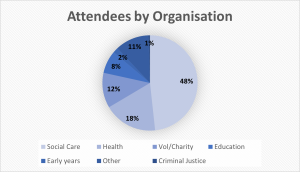
Feedback from training continues to be very positive for both the virtual and face to face sessions:
- The course host was knowledgeable and gave examples of ways of working with YP who may misuse substances.
- Excellent course which I will recommend to other GP’s/ healthcare professionals!
- I loved the way the course was delivered, very relaxed and gave us a safe space to have open conversations.
- The training was informative and provided real stories from young people who had been caught up in CE and CSE.
- Very interesting and well presented. I found the guest speakers to be very helpful and gave me an insight into their work with victims of domestic abuse.
- The ladies who delivered the course where very helpful and knowledgeable. They related the training to real life situations and made the course very interactive.
Alongside the multi-agency training already mentioned, the WSCP has continued to roll out the Systemic Practice training, first brought to us by colleagues in Warrington. Since January 2023 the Systemic Practice Training Pool has delivered eight 2-day events with 318 professionals attending. Professionals have left the training feeling empowered to use the learning with the families they are working with:
- Thank you for providing us with this course. I came away feeling positive and hopeful.
- The training was great and has definitively given me some good tools and knowledge to apply to my practice.
- A lot of the information was not new, but it was good to have the time to pause and reflect on practice.
- This was an informative course, I learnt valuable strategies and techniques that will support me both in my day role but also as a trainee SW.
- The course was interesting, interactive and very well delivered. It was also really good to be in the room for face to face training rather than (often very useful) online training.
- It was a really nice two day training and gave us time to reflect, something we do not always do in our day to day work due to the pressure put on us.
- I feel I have learned a lot of different things that will help me in my practice.
To see the current training calendar, and availability, click here
New training events on the calendar in 2023
In response to the high demand for Systemic Practice training the WSCP developed two further training resources over the summer.
Introduction to Systemic Practice, delivered via Teams, gives a 3 hour overview of the key features of Systemic Practice. This event was designed for people who are not frontline staff or those waiting to go onto the 2 day event. In the autumn 2 events were delivered to 49 professionals. Feedback was good with people saying it gave them a good understanding of how to work in a more systemic way:
- Excellent for a new starter with the council to gain an understanding of systemic practice and where this sits within my fellow colleagues roles.
- it was well presented & easy to understand what was being said. You came away with a greater understanding.
- I am actually excited about the two day training course now i have completed the introduction, i have a useful template too for writing the voice of the child.
Further to this the WSCP, alongside a colleague from Organisational Development, developed an online Systemic Practice training package. Made up of 4 modules, this replicates the 2 day event but is easily accessible and can be completed in smaller bitesize sessions. Currently only available to Local Authority staff via FLO we are hoping in the new year to make this available to all agencies.
Writing to the child and An Introduction to Our Journey is an event exploring the importance of writing case notes and plans to the child, using simpler language. Two events have been delivered so far to 48 professionals. Initial feedback has been quite positive although there will be some review of the delivery moving into the new year, responding to further suggestions from those that have attended.
- For me personally, I would have liked some more written examples on how case notes should be recorded, but I thought the training was great and very informative.
- Very interesting training and helped to confirm the reasons why we need to write to the child and also the impact of the language we use in case has on the child.
- I really enjoyed the school of minds video about using positive words- this video fits in well with the training.
- The videos of the care leavers was really useful to remember the reason for changing to writing to the child. Rewriting the case notes at the end was also really helpful. It would have been useful to have some examples of ‘a good writing to the child case notes’ as well as the examples of what not to do. Thank you though, great training.
Through 2023 the WSCP commissioned four ACES awareness events delivered by Crea8ting Communities. These were 3 hour sessions delivered via Zoom and despite some issues initially with people struggling to access the sessions 55 professionals attended the sessions.
Spotlight Sessions
Spotlight Sessions are now a well-established part of the WSCP training calendar, with different themes or topics running throughout a month. These sessions are delivered on Teams and last no more than an hour, so are a convenient way for professionals to ‘drop in’ and increase their knowledge in a specific area of work.
2023 saw more than 300 professionals access these sessions with the following themes being covered:
- Adultification Bias
- Harmful Sexual Behaviour
- Male Victims of Domestic Abuse
- Safeguarding Risks Outside of the Home (Contextual Safeguarding)
One of each session is recorded and uploaded to our Virtual Learning page on the website which allows available access to anyone not able to attend the sessions live. These recordings can be accessed here alongside other e-learning resources.
Reintroduction of the charge for non-attendance.
When the country went into lock down, all of the WSCP training had to move to online. There was a period of transition where both trainers and attendees had to adapt to this new way of working. Because of this sudden change it was agreed the non-attendance charge would be temporarily suspended.
Over time it was noted the numbers attending training started to drop with many courses running at 50% capacity and this theme continued after the lock down was lifted and some training reverted back to face to face. As a result, the non-attendance charge was re-instated in September 2023. It is now made clear, both on the website and in all invites that go out for training, that anyone cancelling less than 3 days before an event, or just not attending on the day, will be charged, except in extenuating circumstances. The re-introduction of the charge does seem to have had an impact on numbers with most courses now running at about 75-80% capacity.
Training moving forward
Sadly, over the last 6 months we have lost a number of trainers from the Training Pool due to changes in role or circumstances. Whilst this does put more pressure on those still available to deliver, the WSCP will continue to schedule a full training calendar moving into the new year, with events such as Domestic Abuse, Neglect, GCP2 and Working Together running regularly.
In addition, and new to the training calendar, is Restorative Practice Training. With events advertised initially from January to May these events are being delivered by a pool of trainers supported and led by the Youth Justice Service. The sessions are a full day face to face session and considers Restorative Justice principles, the ‘conferencing’ process, and the application of Restorative Practice.
In the early part of the new year the WSCP will be introducing 2 new themes for the Spotlight Sessions where we will be looking at the impact of Parental Mental Health on Children and understanding Boys as Victims of Child Sexual Exploitation.
Training for Schools and Colleges
Wirral Safeguarding Children Partnership remains committed to deliver the Education sector a quality safeguarding training and auditing offer, and this has now reached its sixth full year. The demand for the safeguarding service remains high, with income to allow the post to stay sustainable has grown by almost 20% across 2023.
The offer includes statutory safeguarding training for educational staff, training for governors and senior leaders, Designated Safeguarding Lead training (DSL), plus packages such as safer recruitment, managing allegations, governor and ‘Prevent’ update sessions. New across 2022 and 2023 was a ‘Safer Working Practices’ session, which allows senior leaders in the sector to access both ‘Safer Recruitment’ and ‘Managing Allegations’ in one virtual session.
The safeguarding ‘Health Check / Audit’ available on site to schools, continues to prove popular. WSCP also continues to offer model safeguarding policy templates (which are updated annually), such as Child Protection, Prevent and Low-Level concerns template policies. There are also regular safeguarding updates on the dedicated school web pages, which can be accessed here: Schools Pages – Wirral Safeguarding Children Partnership.
The Education Officer offers a ‘hybrid’ training offer, introduced in response to the global pandemic, which includes face to face and virtual sessions. Sessions range from between 1.5 hours and 3 hours in length and have pre and post session reading to further support learners.
Educational establishments on Wirral continue to source training and support from WSCP in a variety of ways. The most popular is accessing the website to book onto training: https://www.wirralsafeguarding.co.uk/safeguarding-training-for-schools/
Headlines and Achievements in 2023
Training and Support
During 2023, the WSCP has supported 121 educational settings and over 100 agencies across 31 scheduled training sessions
In addition, the Education Officer delivered a further 22 sessions across Wirral, most additional sessions were on-site bespoke ‘whole staff safeguarding and Prevent’ session, plus Governor or Designated Safeguarding Lead sessions for schools, Early Years sector, and external agencies. Also, another 8 ‘Safeguarding’ Health Checks / audits were carried out on school sites and action planning for each school is in place.
The Education sector also accounted for 8% of agencies accessing a wide-range of multi-agency training provided by WSCP’s ‘training pool’ – which includes over 60 sessions provided by a range of professionals. Topics include Harmful Sexual Behaviour, Safeguarding Risks Outside of the Home (Contextual Safeguarding) and Systemic Practice.
The number of delegates accessing education sector virtual safeguarding training across January to December 2023 was 493. No of delegates accessing whole staff and ‘prevent’ face to face safeguarding training across January to December 2023 was 1751.
The different types of school which accessed training over the past year is shown in the chart below:
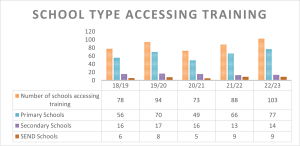
The data shows that 93% Wirral schools accessed safeguarding training in 2023 (an increase from last year).
72% of all Wirral Designated Safeguarding Lead’s (DSL) accessed Wirral Safeguarding Children Partnership DSL training in 2023 (an increase from last year)
Attendance on training:
Attendance in the sector remains consistently high, with less than 1% of all attendees having to cancel at short notice. The main reason for cancellation continues to be service needs in education, particularly Designated Safeguarding Leads (DSL’s) having to cover safeguarding arrangements at short notice.
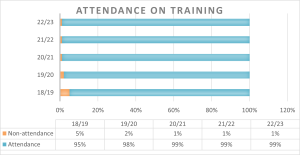
Additional training delivery:
The WSCP training offer has also been extended to support Early Years providers, nurseries and childminders to support whole staff and DSL training. The Education Officer has facilitated training for the DSL teams staff across Wirral Borough Council, School Improvement service, and Wirral’s Sensory, Leisure Service and Family Matters service.
In 2023 the offer to support alternative provision continued to grow and services such as Wirral Society for the blind and Partially Sighted, Dementia Together, Forum Housing, plus a range of multi-agency partners has continued to access the training and support on offer.
Additional Activity to Support Safeguarding
The WSCP education training function has been involved in a number of projects across 2023 to support the Education Sector and to link key priorities for Wirral Safeguarding Partnership, these include:
Operation Encompass:
Merseyside Police have been sharing information about Domestic Abuse incidents to the education sector through Operation Encompass since 2018. Following a comprehensive review both internally and alongside Local Authority partners, Merseyside Police updated the Operation Encompass process in 2023. The Education Officer was instrumental in ensuring the e-briefings and training dates have been distributed across Wirral. To access the briefing, please do so here: OE Briefing (June 2023).
All Key Adults in each setting should undertake the online training accessed free from the Operation Encompass website. All school staff and governors can undertake this free training.
Home Office Prevent Consultation:
The Education Officer was asked by the Home Office in 2023 to be part of a support group to test and feedback on the effectiveness of the updated Prevent training offer to schools to correspond with changes to the Prevent guidance planned for September 2023. This was a good experience and an honour to support the training offer. The Prevent training via the Home Office is available to access here.
S175 Dip Sample Work:
As Wirral Safeguarding Children Partnership (WSCP) is the key statutory body for co-ordinating and ensuring the effectiveness of arrangements to safeguard and promote the welfare of all children in Wirral, WSCP has a duty to hold agencies to account in terms of their safeguarding arrangements and practices. Section 175 of the Children Act (2004) requires an annual audit of the safeguarding arrangements in schools and education settings to provide assurance that their safeguarding arrangements are effective.
Wirral’s Section 11/175 audit model includes short audits undertaken throughout the year, the topics for 2022/23 were: (1) Policies, Procedures and Thresholds, (2) Contextual Safeguarding, (3) Multi-Agency Training (4) Safe and Skilled Workforce, (5)Understanding the Daily Lived Experience of Children, and (6) Local Priorities and Learning.
During 2023 the Education Officer worked with WSCP Quality Auditor to dip sample a selection of 11/175 audit submissions to test the quality of safeguarding arrangements across the partnership.
Individual feedback was provided to those 22 schools chosen, and support offered to develop an action plan if needed. A dip sample document provided a summary of feedback for those involved as a record of the task. Click here for more information on the S175 audit.
Restorative Justice Accreditation:
The Education Officer took the opportunity offered by Wirral Brough Council’s Youth Justice team to attend the four-day ‘Restorative Conferencing: Facilitator Skills Training’ – Training of Trainer (ToT) course to become part of Wirral’s team of trainers. Further accreditation was observed and 11 practitioners are now offering RJ training for agencies across the Wirral. If you want to attend a Restorative Justice training session, please book here: Restorative Practice Training
WSCP Education Committee:
The Education Officer is a founding member of the Safeguarding Education Committee, established in 2023 by WSCP, to help strengthen the relationship between schools, colleges, early years and childcare settings, and other educational providers. The sector all has a pivotal role in safeguarding children and promoting their welfare. There is a priority plan for the committee that sets out a number of areas of work being completed here.
If you would like to know more about the Education Committee, or to join the committee, please contact Amanda Waterfall for more details.
Seven Minute Briefings:
WSCP’s ongoing series of ‘7-minute briefings’ continues to include a range of education specific briefings. Aimed as a learning aid for use in school team meetings, reflective supervision, or just as a whole staff reminder of the key issues safeguarding, the range grows when there is the need to update partners regarding key safeguarding topics or local / national learning from case review. Two recent 7 minute briefings are shown below (click on the image for the full briefing):
The Safeguarding Health Check:
Aimed at providing an independent evaluation of the robustness of safeguarding procedures within an educational setting, the Education Officer continues to carry out a document review, a website check and provides a ½ day on-site audit, meeting with leaders, speaking to governors, key staff and completing a document review. The result of which is an short action plan for the setting to complete and which supports the completion of the section 175 audit tool.
All schools that have had a safeguarding health check and have then had subsequent Ofsted inspections reported back that the action plan was an extremely useful reference document to show progress and celebrate successes in safeguarding process, procedure and practice.
Safeguarding Training and Support Offer – Impact upon practice:
Training Sessions: in the last few years, the evaluation process has been adapted to capture the learner’s views about changes to the offer and is collated electronically via MS teams. Across 2023 of the courses that had pre-reading, 100% of delegates found the pre-reading as useful.
100% of all delegates that completed an evaluation said that the training had updated their safeguarding knowledge and met the learning objectives. 99% of all delegates said that they were ‘very satisfied’ with the session content.
What were the key learning points from the session you attended?
‘Great refresher and useful to discuss topics with a range of professionals’.
‘I came away feeling more confident over the role. I also recognised that actually, I was quite well informed of the role already’.
‘It is always timely to reflect on good practice and to evaluate our own misconceptions. Learning points were covered effectively – 1. Terms involved in safeguarding and the types of different abuse – always useful to refresh our knowledge, especially in this digital age. 2. To know our roles in safeguarding – everyone’s! 3. To ensure our school practices are safe and robustly monitored and report keeping is effective and routinely revisited. 4. To ensure the safety of both ourselves, and children in our school environment. 5. To be aware of how to report concerns – both within the school hierarchy, but also within social services. Thank you!’
‘Lots of information and ideas on how to share with the rest of our staff’
‘Valuable information that covered all areas in a school setting’.
‘It makes you realise that no matter how small, if you think there is a problem, speak out’.
‘Good to reinforce the high standards and good practice that we already have in place. Some ‘easy wins’ to how support how we can make what we do even better’.
How will the Key Learning Points impact on your practice moving forward?
‘Give greater confidence in the thresholds of need and knowledge of how to get support at each level – we are never alone in safeguarding’.
‘There were lots of updates since my last training session, which I will put into practice going forward’
‘To ensure all members of staff can recognise signs of safeguarding issues and have a strong knowledge of how to respond and follow up all concerns’.
‘To ensure that everyone at the school works together to give the staff and children a safe environment’.
‘Talking about other reporting systems and using 7-minute briefing, which we are now adding to our briefing sessions each week. This will help keep the staff thinking about elements of safeguarding’.
‘ALL front-line staff need to be able to recognise the early signs of radicalisation. How the local profile can be helpful in assessing those who could be drawn into terrorism. Dealing with concerns. Explaining the Channel Process. Knowing about these will support me in my role as a tutor and DSL’
Other comments
‘Really, really useful, it was a good pace, we appreciated all the links to go back and check things, the slides are a useful reminder as well’
‘I found the training extremely useful, and it gave me a lot of reminders or better understanding of terms/organisations I had already heard of and knew a bit about e.g., LADO, Operation Encompass, Private Fostering, etc’.
‘The session reinforced and gave us a chance to reflect on why we do what we do. It also gives us the confidence to continue as we do’.
‘Easy to access, friendly and helpful and informative, Thank you’.
‘Thank you to Amanda for another well led session, as always! Delivery was comprehensive but allowed for useful questions and discussion to be integrated too, which made our learning more personalised and contextual to our school and needs’.
The comments and feedback are listened to, and each session is adapted to suit the needs of the delegates. For 2024 and across the coming years, a mix of virtual training and face-to-face training will continue. Those staff who are new to being a Designated Safeguarding Lead (DSL) will have the option of face-to-face training to allow networking with other new DSL’s.
Designated Safeguarding Leads (DSL’s) can also access a Prevent virtual session to ensure they are compliant with the requirements in ‘Keeping Children Safe in Education’ 2023.
All details each of the sessions mentioned and how to book them, or discuss your own organisational training requirements, please visit:
https://www.wirralsafeguarding.co.uk/safeguarding-training-for-schools/
Child Death Overview panel
Wirral is part of the pan-Merseyside and Isle of Man Child Death Overview Panel (CDOP). CDOP is a statutory function and involved the multi-agency review of every child death in Wirral to identify any learning, especially when the death was unexpected.
Merseyside and Isle of Man CDOP exists to:
- provide oversight and assurance of the new Child Death Review processes and ensure that it meets the required statutory standards.
- review all infant and child deaths under 18 years of age. This includes neonates where a
death certificate has been issued, irrespective of gestational age. - identify and highlight any modifiable factors, and bring these to the attention of strategic partners, including Health and Wellbeing Boards, Safeguarding Children
Partnerships and Community Safety Partnerships where necessary.
The purpose of the CDOP report is to:
- Clarify and outline the processes adopted by the Merseyside CDOP
- Assure the Child Death Review Partners and stakeholders that there is an effective inter-agency system for reviewing child deaths across Merseyside, which meets national guidance
- Provide an overview of information on trends and patterns in child deaths reviewed across Merseyside during the last reporting year (2022/23)
- Highlight issues arising from the child deaths reviewed
- Report on achievements and progress from last year’s annual report
- Make recommendations to agencies and professionals involved in children’s health, wellbeing and safeguarding across Merseyside
The following summary information for Wirral was drawn from the Merseyside Annual Report for 2022-23.
Wirral Summary
- 15 deaths reviewed
- 67% of the deaths were expected
- 8 of the 15 deaths (53%) were of children under 1 year of age
Main modifiable factors in Wirral (from most to least common):
- Smoking in the household
- Smoking during pregnancy
- Substance misuse
- Alcohol use
- Domestic abuse
- Service issues
Number of Child Deaths Reviewed
During the 12 month 2022-23 reporting period 97 child death reviews were completed (compared to 104 in 2021-22) across the five Merseyside boroughs and the Isle of Man. 15 reviews were for Wirral children.
| Local Authority Area | Number of Child Deaths Reviewed |
| Isle of Man | <5 |
| Knowsley | 8 |
| Liverpool | 46 |
| Sefton | 14 |
| St Helens | 9 |
| Wirral | 15 |
Age and Ethnicity
In common with previous years the largest number of deaths reviewed were of White British children who were 0 – 27 days old, followed by 28 days – 1 year old. The table below shows the breakdown of the ages and ethnicity of all children reviewed at CDOP.

Number of Death Notifications
The table below shows the total amount of child deaths occuring in each area over the past three years. In Wirral the number of deaths has been 15 in each year.
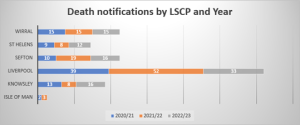
The second table shows the death notifications by age group for the past three years. It shows that the highest number of deaths fall into the neonatal (0-27 days) of a child’s life. In 2022-23 38% of all reviewed deaths were neonatal.
Modifiable Factors (all areas)
The table below shows the main modifiable factors for all areas over the past three years. Smoking, high maternal BMI, substance/alcohol use and unsafe sleep are common recurring themes. However, it can be seen that the incidence of smoking has reduced since last year.
| Modifiable Factor | 2022 – 2023 | 2021 – 2022 | 2020 – 2021 |
| Service Issues | 26% | 19% | 22% |
| Smoking during pregnancy/at time of delivery | 13% | 15%* | 6%* |
| High maternal BMI | 11% | 15% | 4% |
| Smoking in Household | 10% | 15%* | 6%* |
| Substance use | 8% | 11%** | 22%** |
| Unsafe Sleep | 5% | 5% | 4% |
| Alcohol use | 4% | 11%** | 22%** |
| Domestic Violence | 4% | 8% | 4% |
| Engagement with health services/attendance at health appointments | 4% | 11% | 0% |
| Neglect | 4% | 5% | 3% |
| Parental mental health | 2% | 1% | 5% |
| Lack of adherence to health advice | 2% | Not previously included in report | Not previously included in report |
| Child’s substance use | 2% | Not previously included in report | Not previously included in report |
| Mum’s health & wellbeing | 2% | 3% | 0% |
Progress Against Priorities for 2021-22 (progress in italics)
- Review the current processes with a purpose of identifying areas of improving effectiveness and efficiency – An Independent Review of CDOP was commissioned and completed alongside a new CDOP Manager coming into post, so many of the processes in place previously have been updated to enhance efficiency in terms of admin time as well as efficiency for professionals accessing CDOP.
- Improve the quality and frequency of analysis forms from CDRM meetings and work to embed this in Trusts where these meetings are not taking place regularly and work to develop and fully establish the CDRM process in Trusts which have not yet embedded this practice – This work is on-going with a view to an audit being completed in 2023, so will roll over in to 2023-2024 priorities.
- Re-evaluate the role of virtually held panels and meetings following the covid pandemic – The Independent Review also evaluated virtual and non-virtual meetings. As a result, it was agreed that Business Meetings etc. would take place virtually but that due to the nature of the discussions that take place at Panel meetings that on the most part, these would take place face-to-face with the option to run virtually, if necessary.
- Provide assurance that multi-agency partner strategies are in place to address modifiable factors – This work remains on-going, however CDOP has asked for specific assurances from Local Safeguarding Partners regarding issues relating to:
- Dangerous Dogs
- Safer Sleep Advice – with a Safer Sleep Conversation Tool in development for launch later in 2023
- High/low maternal BMI
- Smoking in pregnancy and at the time of delivery
- Substance/alcohol use
- Asthma and poor home conditions
- Improve information provision from GPs – Work was completed between CDOP and Named GPs to revise the forms requesting information from GPs for the purposes of Panel review, making them more relevant to GPs. The revised forms were launched in January 2023. This has resulted in an increase in the number of returns from GPs and will continue to be monitored into 2023/2024.
- Develop use of the Sentinel system for Isle of Man participants – Due to the reviews around efficiency completed by the new CDOP Manager, there will be a move to a new data system eCDOP, meaning that Sentinel use will be discontinued. Isle of Man professionals will be offered training in the new system alongside all Merseyside professionals when the new system launches in April 2023.
- Re-establish a lay representative to panel meetings – This work is on-going and so will be rolled over to 2023-2024 Annual Report for an update.
- Undertake a review of the CDOP and CDR arrangements, including appointment and development of a new CDOP Manager following retirement of existing staff – A new interim CDOP Manager was appointed in October 2022 and the Independent Review into CDOP was commenced in January 2023.
Priorities for 2023-24
- Launch the new online data system – eCDOP
- Train all staff across Merseyside and the Isle of Man in eCDOP
- Continue to monitor the effectiveness of the new forms for GPs to ensure that their vital information is being fed into the reports for Panel
- Re-establish lay member representation at Panel
- Improve quality and frequency of analysis forms from CDRM to Panel and embed the CDRM process
- Provide assurances that multi-agency partner strategies are in place to address modifiable factors and assist in the plans to tackle these where feasible
- Develop themed panels to assist with increasing our understanding of the issues across Merseyside and the Isle of Man as well as potential emerging issues and future planning for CDOP
The full CDOP report for 2022-23 is published here.
Managing Allegations Against Staff
Local authorities are required to have a designated officer for allegations against professionals (the role can be undertaken by an individual or between a team) in accordance with Working Together 2023. In Wirral the LADO role is fulfilled by an individual officer.
The LADO is responsible for the management and oversight of individual cases whereby an allegations is made against an adult who works with children in a position of power and trust within regulated activities, both paid and within a voluntary capacity. An allegation may relate to a person who works with children in regulated activity who has
- behaved in a way that has harmed a child, or may have harmed a child;
- possibly committed a criminal offence against or related to a child; or
- behaved towards a child or children in a way that indicates they may pose a risk of harm to children.
- behaved or may have behaved in a way that indicates they may not be suitable to work with children
All allegations must be referred through to the LADO within 24 hours of identification, however immediate/interim safeguarding measures should be actioned as a priority, to include contact with Merseyside Police if there is suspicion a crime may have been committed against a child. Agencies and professionals must always follow their safeguarding procedures at all times.
When the LADO is not available the Duty IRO or Managers within the unit act on behalf of the LADO to ensure there is no delay and maintain a level of independence required in exercising the role.
Following recommendations from a serious case review ‘Scarlet’, a new system has been implemented to ensure all referring agencies now complete a LADO referral form to ensure information is recorded effectively and defensible decisions can be tracked and recorded. This is in line with the Scarlet Action plan.
As with the Consultation process the LADO has ensured all open cases have an Initial Management of Allegations Meeting chaired by the LADO, a regular Review meeting and a Closure meeting. All the meetings are chaired by the LADO and notes are taken by the LADO. The LADO has recently been provided a minute taker to assist in this task.
The LADO is responsible for having oversight of any investigation and ensuring the relevant agencies are involved and that appropriate information is shared in a timely fashion. The LADO should provide clear advice and guidance to employers and voluntary organisations, liaising with the police and other agencies and monitor the progress of individual cases to ensure that they are dealt with in a consistent and timely manner, and in accordance with Data Protection and Human Rights requirements. (Human Rights Act 1998/Data Protection Act 2018).
Included below is a summary of the LADO Annual Report for 2022-23:
Wirral has one full time Designated Officer. When the LADO is not available the Duty IRO or Managers within the Safeguarding Unit act on behalf of the LADO to ensure there is no delay and maintain the level of independence required in exercising the role.
Key Statistics
The LADO offers a consultation service for all agencies and professionals and ensures all open cases have an Initial Management of Allegations Meeting chaired by them, a regular Review meeting and a Closure meeting. The key statistics for consultations and referrals in the 2022-23 year are shown in the table below:
| Total number of Contacts (see definition) | No of referrals leading to multi-agency strategy meeting or discussion |
| Initial Consultations 267
Referrals 133 Total 400 |
133 (33.25%) |
Consultations
There has been an increase in initial consultations this year with a total of 267 initial consultations held, compared to 159 for the previous reporting period. The number of referrals has been consistent in comparison to the previous reporting period.
Initial Consultation forms are used as first contact on Wirral, to enable us to record all concerns reported to the LADO. A multi-agency strategy meeting would only be held on referrals.
Referrals
The table below shows a breakdown of the agencies who referred to LADO during the reporting period of 2022/23.
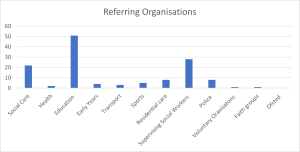
This is the number of referrals reported to the LADO by an agency, irrespective of where the individual works, e.g. parent attends local police station and accuses teacher of physical assault against her son. Police inform LADO of concern this would be recorded as a police referral.
The highest number of referrals were received from Education and Supervising social workers.
Categories of Abuse
With regards to categories of abuse these are split into 4 categories:
Physical Abuse, Sexual Abuse, Neglect and Emotional Harm. As you can see from the table these are equally distributed throughout the year.
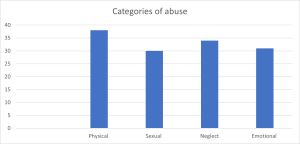
Case Closure
A total number of 100 cases were concluded/closed within the reporting period of 2022 /23 regardless of whether they were referred within that period or not. The conclusion date is the point at which there is no further action to be taken by the employer, social care, the police or courts regarding the allegation. 34 cases (39%) were concluded/closed within 30 days, 22 cases were concluded/closed within 3 months, 28 cases were concluded/closed between 3-12 months and 3 cases took over 12 months to conclude/ close. The cases which take the longest to conclude are often complex cases which have resulted in a police investigation. The LADO ensures that a full closure summary is completed before any case is closed.
There are a number of possible outcomes following a referral to LADO:
- The allegation is malicious
- The allegation is unsubstantiated
- Possible Disciplinary measures for the employee
- A police investigation
- A police prosecution
It is important that the correct definitions are used when determining the outcomes.
- Substantiated – there is sufficient evidence to prove the allegation
- False – there is sufficient evidence to disprove the allegation
- Malicious – there is clear evidence to prove there has been a deliberate act to deceive and the allegation is entirely false.
- Unfounded – there is no evidence which supports the allegation being made.
- Unsubstantiated – there is insufficient evidence to prove or disprove the allegation.
Out of the 100 cases that were concluded 44 were deemed to be substantiated, 18 were unfounded and 38 were unsubstantiated.
To go to the Introduction click here
To go to Independent Scrutiny click here
To go to the Journey of the Child click here
To go to Learning from Case Reviews click here
To go to Multi-agency Working click here
To go to the Big Learn Event click here
To go to Progress Against Priorities click here
To go to the Business Plan click here
To go to the Glossary click here


